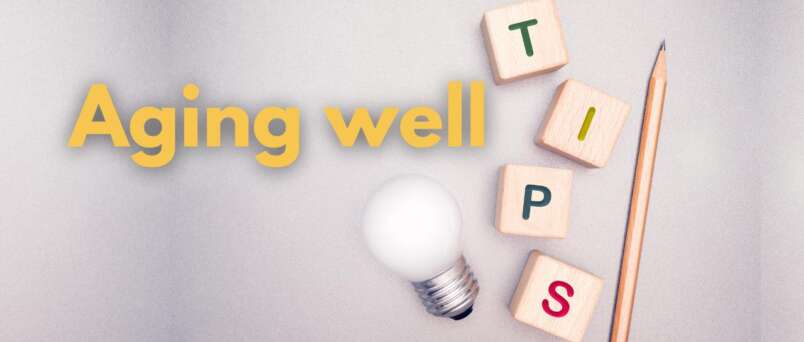Accentuate the positive: nine ways to age better
As a society, aging generally worries us. Whether it’s our parents, uncles or aunts, grandparents or ourselves we are concerned about, it can be a daunting prospect.
However, it doesn’t have to be. With the right attitude and some help and support from others, we can overcome obstacles and even reduce the impact of some aspects.
Here at Vytality in Calgary, we’ve put together some of the ways in which we can all age better by making simple changes to our lifestyle, our mental approach and our health.
Have a positive attitude
Ageing is a natural process. It’s a gift which brings wisdom and maturity, and helps us appreciate what has been and look forward to what is to come.
So, don’t dwell on what might happen as you age. Instead, embrace the different ways you can approach life in your senior years. A robust mind-set can even boost longevity. (See our previous blog for details!)
Eat well (and enjoy your food)
- Eating healthily in your senior years doesn’t mean ditching all the things you love. Enjoy a balanced diet, and your health will benefit, but enjoy a few pleasures along the way – a very restrictive diet can be as bad as one that is too indulgent!
]For more on healthy eating for seniors follow this link - Key to maximising the benefits of a balanced diet is maintaining your gut biome – discover more here.
Take some exercise
Your body loses muscle mass at quite a rate after the age of 30. You lose around 3-5% every decade, and after the age 60, this percentage increases. Muscle loss can lead to falls and related injuries, but exercise can help slow this process. You don’t need to rush out and join a gym, just add a few minutes of exercise to your day. Resistance work is particularly beneficial when using weights. Again, no need to invest in dumbbells, just use everyday objects such as a can of beans or a milk carton instead.
Walking is good exercise too. If it’s safe for you to do so (ask your physician first), try to get a little out of breath every day for half an hour or so in the fresh air. Your Vytality caregiver will be more than happy to help you go out and about in our lovely Fall weather.
Improve your sleep health
It’s a myth that as seniors, we require much less sleep. We require almost as much as we did in adulthood, and it needs to be quality sleep to maintain our mental and physical health. According to the Canadian 24-Hour Movement Guidelines, those aged 65+ years should aim for 7 to 8 hours of sleep. It’s also important to establish consistent bed and wake up times.
Sleep can be interrupted by multiple factors including:
- Chronic conditions including arthritis
- Conditions such as restless leg syndrome
- Anxiety and stress
- Visits to the toilet
Try to mitigate these problems by cutting out caffeine during the day, especially from about midday onwards. Keep the hour before bedtime TV screen and cell phone-free.
If you are the caregiver for a loved one, constantly listening out and then getting up to care for someone else can be exhausting. Our respite service can cover night-times, so you can sleep and know that one of our highly experienced caregivers will be there to care for your loved one all night long.
Keep in touch with your doctor
It’s a good idea to talk to your physician about things which concern you.
If you are on medication of any kind, a regular review of what you are taking by your doctor can help you manage your health with more confidence. You do need to know what you are taking and why, especially if you take a number of medicines and have done for some time,
Dementia and aged associated memory impairment
Age-associated memory impairment is considered a normal sign of aging. It’s not necessarily a sign of dementia, according to the Alzheimer Society of Canada:
“Though you may have difficulty remembering things on occasions, like where you left your keys, a password for a website or the name of a former classmate, these are not signs you have dementia. You may not remember things as quickly as you used to, but most of the time there is no cause for concern.”
It is important to remember that there are conditions which have nothing to do with dementia which can cause memory loss and confusion. A low vitamin B12 level for example or low thyroid hormones or a UTI (urinary tract infection) can all affect your memory, so it’s important to get these checked by your doctor or healthcare team.
Look after your brain
Doing lots of different activities can help stimulate your brain to make new connections. So-called brain games and other activities have been shown to slow cognitive decline, so you want to keep your mind active. Three proven ways to stretch your brain are to:
- Do logic puzzles and crosswords
- Learn a new language
- Take up a new hobby or activity
The important thing is to enjoy what you do, so you’ll keep doing it! For more suggestions, see our blog on the subject.
Be open to new friendships with younger people
As we age, friendship groups inevitably shrink. Try to look outward and make some younger friends both to stimulate your mind and ward off potential isolation or loneliness. You have a lot to offer and so do they, with shared stories, different experiences, and different perspectives.
Help yourself with home care
If your enjoyment of life is marred by the dull chores and necessities of life, home care can help! Our team can take of the mundane everyday tasks you may no longer want to do, from laundry and tidying up to meal planning and grocery shopping. Our team of Partners can also take care of repair and maintenance jobs around your home, and help make adaptations and improvement to make it more accessible too.
For more information, or to schedule your initial consultation:




